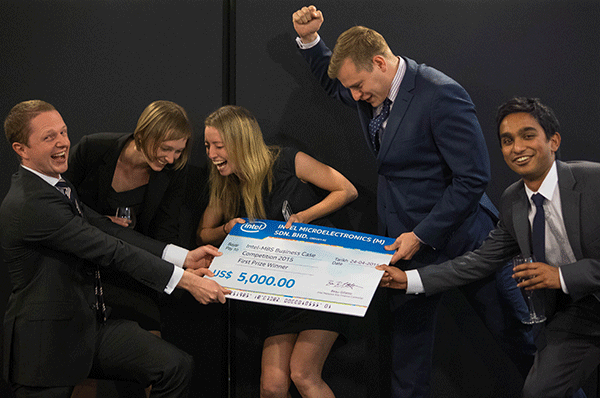
The first Intel-MBS Case Competition was held last month, with the $190 billion technology giant rewarding the winner with a US$5,000 first prize.
18 teams made up of 77 part and full time MBA students took part in the competition, with 5 teams given the opportunity to present business cases to Intel on how its technology could connect people, devices and platforms in the rapidly developing ‘Internet of Things’ area, which Intel believes is the ‘next big thing’.
Each of the final teams had 30 minutes to impress the judges, answering questions to claim a stake of the total US$10,000 prize pool.
Judges were extremely impressed with the MBA students, saying it was a difficult decision to pick the overall winner.
Case Competition judge and Site Controller at Intel’s Penang chip plant Beau Gillette said, “I am absolutely blown away by the passion, energy and interest of your students.”
Other judges included Intel Malaysia Design Centre Finance Controller Amit Minocha, Intel Malaysia Design Centre General Manager Chris Kelly, and MBS academics, Associate Professor of Strategy Geoff Martin and Associate Professor Strategy Management Kwanghui Lim.
Among the ideas that were pitched were wearables, integration, big data and partnerships, which included a baby-monitoring system and wearable devices for pets to monitor vitals.
Team Wearwolves and their hospital-based ecosystem idea took out the top prize, impressing the judges with their bold idea to target the lucrative healthcare market.
The idea would result in data from medical devices being integrated with medical staff and patient histories to provide more efficient, responsive and higher-quality care.
Wearwolves’ team member Duncan Graham said, “To stand in front of senior Intel executives and be part of a team that successfully pitched an internet-of-things strategy was one of the biggest thrills I’ve experienced.”
“It was also a great opportunity for us to apply many of the key lessons from our studies to a complex and challenging problem.”
Mr Gillette said he was impressed with the diversity of ideas presented at the competition, which showed the huge range of possibilities opened by the internet-of-things technology.
“Hopefully, you get a sense of how complex this is, how difficult it is to find your way, not just in technology but, specifically, within IOT. It’s a chaotic field right now. There is no standardisation,” Mr Gillette said.
“And that’s going to be a big key driver for whoever ends up winning the lions share of the market in this ‘next big thing’ – figuring out how to drive some kind of standards that are built around, hopefully, our architecture. But that’s a big piece of winning in this space.”
Mr Gillette said Intel created the Case Competition as a way to form and build relationships with top business schools.
“I’m the site controller in Malaysia, which is our biggest site in Asia,” he said.
“So we recruit a lot of Malaysians, and there happens to be about 8,600 Malaysian students in Melbourne. Then I learned about the quality of the school here. So, when I first came to visit Melbourne Business School, it was pretty obvious that this is where we wanted to focus.”
“And once we landed our first MBA graduate, Sanjeev Selvarajah (MBA 2014), and saw how quickly he’s adapting – and he’s clearly going to be adding a lot of value – we knew this is an area that we want to continue to invest more in and build that relationship.”









